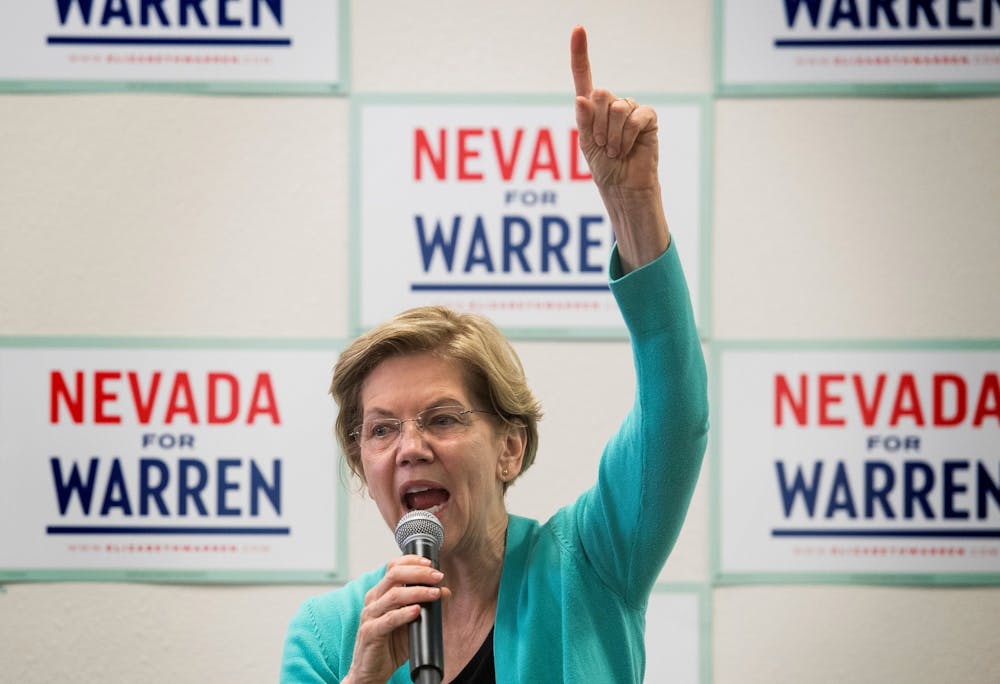Wednesday’s Democratic presidential debate was undoubtedly the most vitriolic and combative contest of the primary season so far. An incessant flurry of insults and challenges created a political typhoon of personal attacks that mercilessly buffeted the candidates all night.
The unlikely eye of this storm was Sen. Elizabeth Warren, D-Mass., who was looking to reassert her campaign’s presence after a lackluster performance in the New Hampshire primary race.
However, she only succeeded in proving that her candidacy is lashing out in the midst of its death throes. Warren’s offensive style, a departure from her typical cautious neutrality, signals her dire position in a race for the Democratic nomination that has all but ran away.
Warren’s firebrand rhetoric was effective at points, such as when she noticeably flustered former mayor Mike Bloomberg by asking him to release an unknown number of female former employees from the non disclosure agreements they signed with him. At one point she likened former South Bend, Indiana mayor Pete Buttigieg’s health care plan to a powerpoint and Sen. Amy Klobuchar’s to a sticky note, drawing laughs from the crowd.
Donors were apparently impressed by Warren’s newfound sense of urgency. As Wednesday was her largest fundraising day to date. She raked in $2.8 million, $1 million of which was donated while she was still on stage. Sen. Bernie Sanders, I-Vt., earned $2.7 million that day.
But we shouldn’t forget that the reason Warren had to change tactics in the first place was because of the painfully obvious disconnect that still exists between her and the average voter. I think part of the reason she has maintained a lackluster polling position throughout the primary season is her lack of appeal to several overlapping groups.
Her wooden expressions and academic demeanor are off-putting to working-class voters, a demographic that helped swing the 2016 election in President Donald Trump’s favor. Independents tend to favor more moderate candidates such as Klobuchar, Buttigieg and former vice president Joe Biden. Additionally, moderates have been flocking to the emerging campaign of Bloomberg, who has spent $124 million advertising in Super Tuesday states by appealing to his centrist electability. Warren also polls poorly with minorities.
She doesn’t seem to have a good foothold on progressive Democrats, either. For starters, she was not able to find a good point of attack on Sanders, with whom she has been competing for the party’s progressive wing since the start of the campaign. Yet Bernie’s steadfast support among progressive Democrats and democratic socialists is unlikely to be fazed even if Warren was capable of winning all the undecided progressive Democrats who remain.
This is not to say that Warren can’t still maneuver a brief comeback from her campaign’s recent stagnancy. It is to say that she cannot still maneuver a victory in the Democratic primaries. This is because she appeals to neither key demographics which have long been considered a fundamental part of the Democratic base nor to the majority of progressive Democrats she claims to represent.
Warren was never the candidate for me. Her dry expressionlessness turned me off from the start, as I suspect it did for others. I respected Warren's departure from predictability in the Nevada debate, but unfortunately it only proved her efforts are too little and too late.
Despite what has been lauded as her best debate performance yet, Warren is still teetering just before the precipice of a political fall. Where others saw brazen confidence, I saw desperation. While others noted Warren’s developing political acumen, I decided that even a considerable short-term surge in popularity won’t do any favors for her long-term viability.
Carter Cooley (he/him) is a junior studying political science. After graduating he plans to go into political campaign management.






